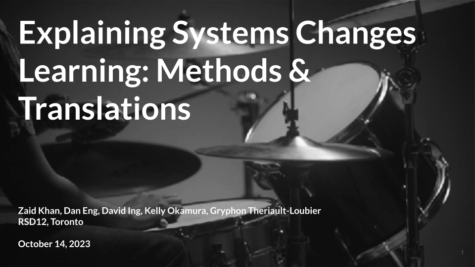For the Relating Systems and Design RSD12 symposium on October 14, 2023, members of the Explainers subgroup of the Systems Changes Learning Circle conducted an in-person workshop on “Explaining Systems Changes Learning: Metaphors and translations” at OCADU in Toronto.
RSD12 included both in-person sessions and online sessions. In the planning phase for the symposium, our group outlined the approach we would take.
In the abstract, we opened up the challenge of explaining systems thinking as a general topic, with Systems Changes Learning as one (of many) approaches to systems thinking.
Abstract
Have you ever found difficulty in explaining systems or design concepts to possible collaborators? While the general public has arguably picked up on the idea of ‘a system’, moving that understanding to a working dialogue is often harder than it sounds.
In this workshop, we’ll explore how to engage with difficult systems concepts with a variety of audiences, using ‘Systems Changes Learning’ as a backdrop.
This workshop topic is informed by the Systems Changes Learning Circle, which originated in 2019 on a 10-year year discovery journey to investigate the idea of system(s) and their associated change(s). In particular, the workshop will focus on the current ‘hub and spoke’ process of systems changes, and will dive into the idea of rhythmic shifts within systems (Ing, 2022b). This topic provides an introduction to Systems Changes in general, as well as a compelling element of systems changes that truly requires better ‘explanation’.
In this workshop, participants will engage with the subtlety and difficulty of sharing systems and design concepts when faced with a wide variation in ‘systems literacy’. Participants will explore a number of techniques (e.g. metaphor, tone) that can both assist and hinder in sharing these concepts.
We consider the sharing of concepts to be ‘explaining’, and our circle uses the term explain to define our work. Given this, we accept this term could be perceived as a one-way transmission, and we recognize a ‘good or satisfying explanation’ will require a relationship with and understanding of both ourselves, as systems practitioners, and the audience; their place of attention, context, and experience. The ‘learning’ in Systems Changes Learning is collective between participants and facilitators. We consider the workshop to be contributing to the ‘translational action between research and practice’ need identified by RSD12, or more specifically, the contextual action learning approach (Barba, 2023; Ing, 2022b; Ramirez, 1983).
As the 2023 RSD theme of Entanglements suggests, how we set, interact with and reflect upon initial conditions and relationships, as well as their outcomes, informs our worldview and way of being (Barba, 2023). Within the Systems Changes Circle, we like to bring some consideration of humility and even humour to this – we’ll see what we can do for you here!
With this in mind, the workshop guides look forward to collectively learning with RSD attendees to improve our collective ability to share and relate to systems ideas with the goal of building understanding.
References
Barba, E. (2023). What and Why: Entanglements. Relating Systems Thinking and Design. https://rsdsymposium.org/what-and-why-entanglements/
Ing, D. (2022a). Appreciating Systems Changes via Multiparadigm Inquiry: Architectural Design, Ecological Anthropology, Classical Chinese Medicine, Systems Rhythms. Journal of the International Society for the Systems Sciences, 66(1), Article 1. https://journals.isss.org/index.php/jisss/article/view/4057
Ing, D. (2022b). Systems Changes Learning: Recasting and Reifying Rhythmic Shifts for Doing, Alongside Thinking and Making. Journal of Systemics, Cybernetics and Informatics, 20(7), 11–73. https://doi.org/10.54808/JSCI.20.07.11
Ramirez, R. (1983). Action learning: A strategic approach for organizations facing turbulent conditions. Human Relations, 36(8), 725–742. http://doi.org/10.1177/001872678303600804
The primary agenda for our workshop was to share our experiences, and engage with others who might have an interest in sharing our journey.
Anyone interested in joining the Explainers subgroup can get a better feeling for what it’s all about, by talking to anyone on the team. In 2023, we’re in year 5 of an espoused 10-year journey. Our rhythm has been to meet roughly triweekly.



